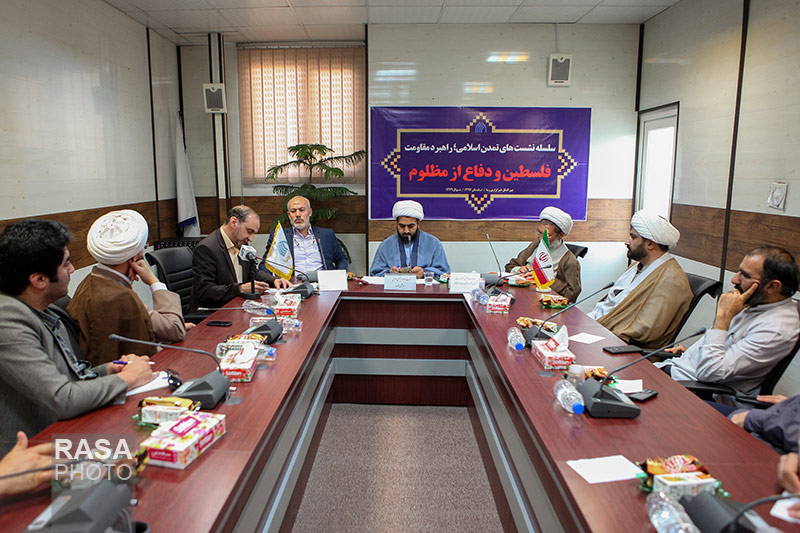
RNA – The second conference of a series of academic conferences entitled “Islamic Civilization: Resistance Strategies” was held on the subject of “Palestine and the Defence of the Oppressed” in the presence of Hujjat al-Islam Mohammad-Hasan Zamani, the director of the Office of Social and Political Affairs of the Islamic Seminary, and Naser Abu-Sharif, the representative of the Palestinian Islamic Jihad movement in Iran, at the conference room of Rasa News Agency.
At the beginning of the meeting, Hujjat al-Islam Momeni referred to the importance of the issue of Palestine and Islamic civilization and said, “Islamic civilization and the Islamic Resistance Axis is one of the important issues that exists today in the arena of civilization building, on the internet and even on satellite networks, where many doubts are spread about theis issue.”
The academic secretary of the conference added, “Today, there have been significant gains in the arenas of the Islamic Resistance in Syria, Lebanon, Iraq, Yemen and especially Palestine but there are still events that take place on the field in regards to which there needs to be a serious explanation.”
Referring to the activities of various Palestinian groups from the past until now, Naser Abu-Sharif said, “The Palestinian Islamic Jihad is a national Palestinian movement with the authority of Islam.”
The representative of the Palestinian Islamic Jihad Movement in Iran stated, “The Islamists were the primary leaders of national activities in Palestine until 1917, when it was occupied by the United Kingdom until 1948, when the Zionist regime was established.”
Hujjat al-Islam Momeni added, “After 1948, a leftist nationalist movement was formed and came to the fore and no other Islamist leader took leadership of the Palestinian movement but this did not mean that their leaders weren’t Muslims but rather the leaders of the movement weren’t Islamists and the likes of this victorious movement were nationalists and ethnocentrists.”
Abu-Sharif said that the Islamic movements didn’t have any specific activities after 1948 and said, “Another movement that existed at that time was the Muslim Brotherhood, which did not have many activities and until the late 1970s, they didn’t take command of the struggle.”
Referring to the victory of the Iranian Islamic Revolution, he stated, “In the late 1970s, the Islamic Revolution of Iran was victorious and created a great change and an earthquake in Palestine. However, before this, the existing Islamic movements had the idea that Palestine and Islam must be placed as an equation in the Palestinian movements and this issue continued until after the victory of the Islamic Revolution.”
Also, Hujjat al-Islam Zamani, while referring to the importance of academic maturity in Islamic societies, praised the academic programs of the Rasa News Agency and stated, “The group of news agencies must move to target the academic maturity of Islamic societies in order to play a role in promoting knowledge in society because, if information, news and ideas are based on the fundamental foundations of knowledge, it will be more stable and less vulnerable.”
The director of the Office of Social and Political Affairs of the Islamic Seminary referred to the history of Islamic civilization and divided Islamic civilization into three categories and said, “In a division of Islamic civilization, the three great periods of the establishment of Islamic civilization will see the resplendence and the regeneration of the new civilization.”
He continued, “The first period is the establishment of Islamic civilization, which was formed with the advent of Islam, the Prophet and the coming of the Quran. The society of the Arab peninsula, which was one of the most backward populations among all of the human societies in history, arose over the course of 23 years and this same society became one of the most civilized human societies and the flagbearer of civilization and knowledge.”
112/971